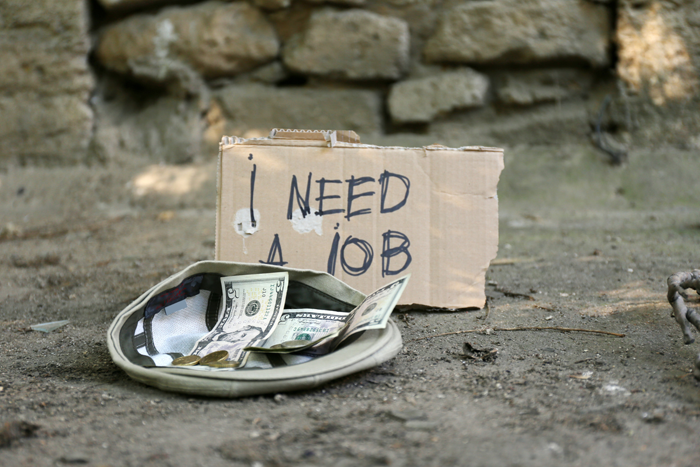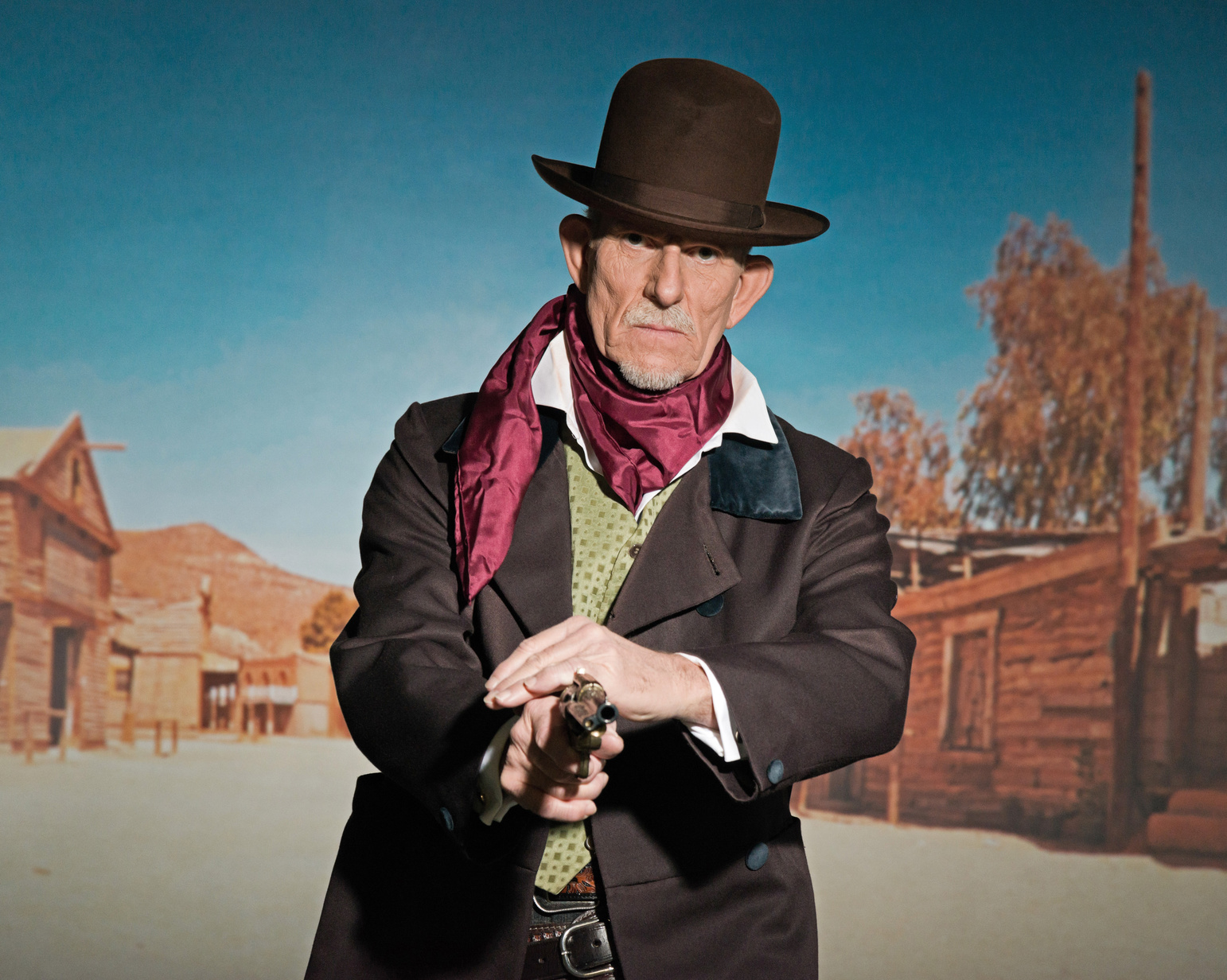If you operate or travel in any urban or suburban area, you will encounter street beggars.
Street beggars are a security threat because, more often than not, the average panhandler has mental problems, chemical abuse issues, or both. This makes the average panhandler erratic, unpredictable, and potentially violent.
Combine this with the nature of the interaction — the street beggar is demanding to benefit from what you have earned, no matter how politely or elaborately he phrases the request — and every panhandling encounter is a potential “street interview,” a precursor to assault.
One Of The Most Likely Security Threats …
Aggressive panhandlers are easily the security threat with which most of us deal on a day to day basis.
You can find such panhandlers in any American city. They’ve become a modern plague, of sorts, and the problem is that if you speak out against the issue or support ordinances that make it illegal to beg on street corners and off ramps, you will be told you “lack compassion” or that you don’t care about those who are less fortunate.
The problem is that some of the street people you encounter are trying to con you.
While many beggars are honest enough simply to bark at you for your money without pretext, many others use a variety of ploys designed to gain your sympathy or allay your suspicions.
Common beggar ploys have one thing in common: they are all, pardon my language, bullsh*t.
The following indicators are by no means an inclusive list, but they serve as a great thumbnail guide to some of the more common street lies. Granted, there are people out there whose hard luck stories are actually true, but they’re much fewer and farther between than many people think.
Most of the time, when someone tells you an elaborate story and asks you for money, their story is a lie. Let’s look at some of the different types of lies and ploys you could encounter on the street.
Now, before we get started, you may be wondering why it matters. Couldn’t you just refuse to give people money?
Well, you certainly can, but often, when someone tries to con you out of money on the street, they’re actually “interviewing” you. They’re testing you to see if you’ve got money at all and whether you might be an easy mark. If you fall for their ploy, they might just decide you’re worth targeting for a mugging.
Giving Too Much Information
This is the big one, the ploy indicator most frequently encountered. Liars and beggars almost always fail to keep things simple. They launch into incredibly involved stories on the theory that the more detail they include, the more plausible the ruse will seem. This is not the case. A good liar keeps things simple because this leaves fewer traps to remember and avoid.
A young man wearing gold chains over a muscle shirt once gave a friend of mine an elaborate song and dance about needing money to make a phone call because he needed a ride to some outpatient cancer treatment center, an appointment he’d missed previously due to a number of factors (which he supplied). The whole pile of nonsense was obviously an excuse to separate my friend from his money. Always remember that the more elaborate and weirdly specific the story, the more likely it is to be a lie.
Asking For Gas Money
Apparently we are in the grip of a nationwide epidemic of stranded motorists, all of whom just need two or maybe five dollars worth of gas to get them on their ways again.
The only cure for this epidemic is the kindness of strangers, it would seem, for this army of stranded motorists is even now wandering the streets, asking passers-by for help. Often the request is accompanied by a weirdly specific amount. For whatever reason, the muggers and con-men think that their targets are more likely to respond positively to a request for six dollars than a request for a ten or a twenty. Almost every time you encounter this request for gas money, it’s bogus.
Will Work For Food…?
I recall a study some time back — it might have been in USA Today or some other major media outlet — that speared a popular myth. Most of the “homeless” carrying signs saying “will work for food” actually wouldn’t when offered the chance.
Take a good look at the next beggar who asks for money because, he tells you, he’s hungry. He doesn’t look like he’s starving, does he? He looks dirty and unkempt, sure, but emaciated?
People who are really starving look the part. You see plenty of homeless people begging because supposedly they want to eat, but most of them aren’t starving to death at all, and very few of them are going to use the money they get for food.
The average homeless person will tell you, in fact, that they can find food, whereas the things they want most — alcohol and drugs — require money to obtain. It’s almost guaranteed, therefore, that if you give a street bum money for food, he’s not going to use it to eat. He’s going to use it to get booze or drugs because he wants to get high. Most of the homeless have mental or substance abuse issues. That’s a statistical fact.
Speaking Too Quietly On Purpose
A friend told me that he was once waiting outside a coffee shop downtown that was plagued by aggressive panhandlers. He said the beggars would sexually harass young women in the area when they weren’t begging for money. My friend watched a panhandler come up to a group of women and mutter something they could not hear. This was apparently is go-to move for begging. It relies on our natural, deeply ingrained impulse to ask someone to repeat themselves if we can’t hear them or didn’t understand them.
Everyone who did not ignore the homeless man stopped and said something like, “What?” or “Pardon?” because he muttered so quietly. This is a deliberate, calculated decision on such a beggar’s part. Mumbling panhandlers hope to catch you off guard, counting on the cultural reflex that prompts you to ask for clarification when you do not hear what someone says. We all fall for this without even thinking. It’s just something we’re very used to asking.
The appropriate response to anyone who accosts you and mumbles is no response at all, though you may choose to observe silently to see if the speaker repeats his or her plea.
Can You Help A Veteran, Brother?
Most of the homeless “veterans” one encounters are veterans of long begging careers and nothing more. Those holding signs proclaiming their veteran status are hoping to cash in on your gratitude to those who fight and die for our country. Some will go so far as to dress themselves in soldier costumes, wearing fatigues or boonie hats as if they’ve just gotten off the first boat from Over There to find themselves destitute among spitting hippie ingrates.
The majority of “veteran” beggars are liars who have never served in the U.S. military. Your heart is in the right place, but don’t fall for this one.
Using Christianity As Leverage
Ours is basically a religious society. Many people will try to invoke religion as a means of gaining trust or allaying fear. Some subtle con artists will wear crosses (which are large enough to be obvious to those whom they accost). Others will work references to God or church into their ploys.
The idea is that you’re more likely to trust the motives of someone who claims to be a good Christian than someone who is not. Anyone invoking God while implying a need for cash is simply using religion to mask a ploy. Keep that in mind whenever anyone tries to play on your religious sensibilities.
NOTE: I’m very aware that Jesus repeatedly preached to help the poor. Do that. Just do it safely, like volunteering at a soup kitchen, or giving money to your church if you know they are spending the money to help the community, etc. Nothing in the Bible says you have to compromise your personal safety to help the “poor” on your walks through potentially dangerous urban areas (Jesus also knew muggings occurred, a la the parable of the Good Samaratin).
Asking For the Time
There are a couple of ploys that aren’t requests for money, but requests for something else. One of these is when a potential mugger walks up and asks you for the time. Usually, someone who asks you what time it is just wants to know that much. But sometimes, when a guy asks you the time, he’s hoping to distract you so he can hit you, stab you, or put a gun in your face.
Your best bet is to ignore and ploy through (continue walking). Or say I don’t know and keep walking. Or “Can’t help you man, sorry” and keep walking …
If you do give someone the time, never stare down at your watch or your phone. Always bring your arm (with your watch on it, or your phone in your hand) up to your eye line between you and the other person. This makes it harder for them to surprise you because you’re watching them, and also gets your guard up to put your arm between you and them.
Asking For A Cigarette or a Light
Asking for a cigarette or a light is the same thing as asking for the time. The mugger (if indeed he is a mugger and not just someone hoping for a smoke) wants to get you fixated on the task of offering the smoke or getting your lighter fired up.
This task can take both hands, which is what a mugger wants. While you’re occupied with that, he hits you. The only way to deal with this one is to refuse. Whenever anyone asks you for a smoke or a light, say you don’t have one. Even if you have a cigarette hanging out of your mouth when you say it, refuse the request and keep moving along.
What to Do When Someone Approaches You
If you are accosted by a street person, particularly one whose pitch involves any of these ploys, do not engage that person.
No dialogue will improve the situation. A null response gives the beggar nothing with which to work in attempting to involve himself in your life.
I like the response of continuing to walk. Get out of the physical area as quickly as possible. If you feel you must say something, “Sorry buddy, I can’t help you”.
If the beggar begins to encroach on your personal safety zone, warn him or her off. A firm, neutral “Step away from the car” or “Stand back for me please” should suffice.
If the beggar does not listen and tries to engage you, maintain space as needed. You can escalate to a loud and firm, “BACK OFF!” if it doesn’t seem like the first request was obeyed.
If the encounter becomes an assault, do what you must.
Remember that most people who approach you in public asking for money are liars. You should not trust them and you do not owe them a blessed thing.
No one has the right to demand your money, no matter with what ploy the demand is disguised. These “Street Encounter” skills maybe be even more important to practice than most other self-defense skills because you are so likely to use them in your every day life.




![How Many Shots Will It Take? [Video]](/wp-content/uploads/2025/06/Depositphotos_2724272_S-218x150.jpg)





![What Level Holster Should You Be Using? [Video]](/wp-content/uploads/2024/04/Depositphotos_44548439_S-218x150.jpg)











![Do You Need To Buy A Small Gun For Your TINY HANDS? [Video]](/wp-content/uploads/2024/12/Depositphotos_23477193_S-100x70.jpg)
![Democrat Candidate’s Attempt To Court Gun Owners Gets Even MORE RIDICULOUS [Video]](/wp-content/uploads/2024/11/Depositphotos_307104850_S-100x70.jpg)







![Optic Ready vs Milled slides? [Video]](/wp-content/uploads/2024/02/image-3-100x70.png)
![[Checklist] What Gear You Need To Take Pistol, Rifle & Shotgun Training Courses [Video]](/wp-content/uploads/2023/07/Depositphotos_275087632_L-100x70.jpg)
![What is in Carter’s 2023 EDC? [Video]](/wp-content/uploads/2023/07/Depositphotos_146856137_L-100x70.jpg)



Caleb, my pat answer is sorry, I don’t carry cash while continuing to walk. I’ve got hundreds of funny stories about this but here are two. While working the fugitive unit, a construction company owner I was interviewing told me the fugitive I was looking for was at a particular construction site and he agreed to accompany me to the site. We passed a panhandler on the street and the man turned beet red. He told me he felt sorry for the guy and offered him a laborers job. The panhandler told him to take a hike, telling the business owner he makes more money with his ‘will work for food’ sign then he could working for him. The other was when we working a surveillance in a particular are of the city, over several days. One of my partners saw a panhandler and got real pissed. The panhandler had a broken alternator belt in his hand asking for money to replace the belt so he could get back up to Los Angeles. The day before my partner felt sorry for the guy and gave him 5 bucks. Here he was back on the same corner holding the same broken belt. Needless to say my partner was pissed. Anyway, there are as many scams as there are panhandlers. You are correct, the vast majority are mentally unstable scammers.
Hahaha! That’s hilarious.
I think there was a study showing a “homeless” guy was making something like $50k/year (tax free which is equivelant to what almost double that before taxes?) working his angles outside Ikea.
Great stuff.
Here in Ohio, there’s a common story where the person has to get to Toledo/Detroit/Cleveland and needs gas because his wife’s having a baby. I usually reach into my vest-where I actually do carry a heater-and say, “I hope your baby dies, m/f’r-what do you think of THAT”? This usually happens where the sympathetic yuppies stop for supper items on the way home. I had a rather awkward situation at a gas station one day when I was approached by a slovenly-appearing hilljack and-reaching into my vest- I said “I don’t have any cash”. He chuckled and said he needing directions to whatever road. Oh, my bad.
Wow. That escalated quickly lol
Bullshit… This article is a clone of a PDF written by a self-defense wannabe who advocates street chucks and street swords for self-defense. Its based on a paranoia of anyone with less money then someone wanting what they have.
1. Not all homeless are violent, criminals, mentally ill or drug addicts. Some are but not all. Why are the homeless a threat? Why can’t these same approaches be used by others?
2. There are professional homeless who panhandle for a living and make good money at it… I knew an old man who did this, dressed in dirty cloths and lived in a 3 bedroom house and drove a nicer car then me.
3. Any unknown person who approaches you in the street is a possible threat. Of you are expecting the threat to be a ragged bum, you are going to ignore the clean cut kid coming at you.
4. Saying anything is going to produce one of two results, 1. It’s gets physical and 2. It doesn’t. Trying to stand your ground and act tough will get you hurt if you don’t have the skills to defend yourself. Yell “Stay Back” when a bull charges you and see if it stops…
This blog just lost a lot of respect…
Agreed on points 1-3 but you’re way off on point 4.
So someone invades your personal space and you recommend not opening your mouth? Nobody said anything about “stand your ground” — you should probably read the entire article before giving your opinions as I clearly stated “I like the response of continuing to walk. Get out of the physical area as quickly as possible. If you feel you must say something, “Sorry buddy, I can’t help you”.”
Guys like Craig Douglas/SouthNarc teach a LOT of verbalization for managing unknown contacts because it can mean the difference between life and death.
When someone comes up to me to ask whatever, I ask them before they get to me if they have $5 for gas. They have all turned around with saying something like they can’t help. Usually I’m in jeans and a t-shirt, so they might not think I’m some rich guy or a target. I may be fortunate, but I’ve never had anyone (panhandler, homeless, or bum) attack me. If asked the time and I have a watch on, I tell them I can’t tell the time and I hold my arm up shoulder level with the watch facing them (no Rolex, I’m poor), and ask them the time. Then I can watch them.
I’ve had lots of street fights, but never with any that were mentioned above. They just came for the fight and to rob me.
The one point about yelling “Stay back” to a bull to see if it stops from charging is not like a human. If there are others on the street and you yell stay back or something like that, others will turn to see what is happening and nothing will probably happen except you making a quick exit. If it’s just you and him, then it may well be like the bull. I have had a couple of drunks approach me and the best thing I thought to do was just stay out of range and move away from them, never losing sight of them.
There is one question that was not answered. Is this a clone of someone’s article?
Comments are closed.